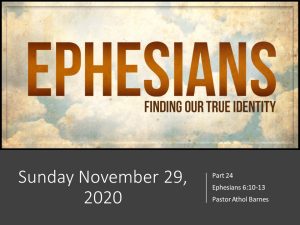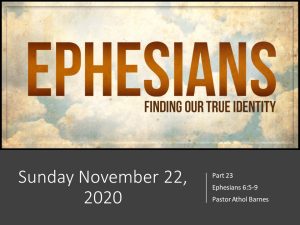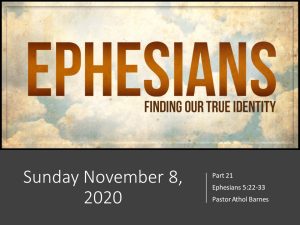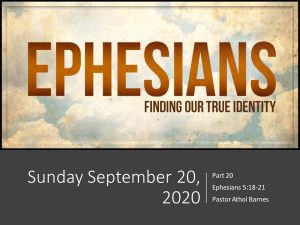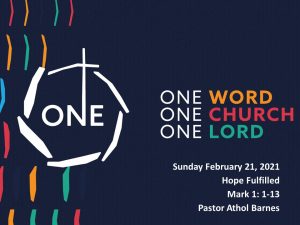
Mark 1:1-13
We have all experienced seasons when we longingly hope for something to happen, but it seems that the fulfilment of the hope is so far away. Proverbs 13:12 says that hope deferred makes our hearts sick.
The people of Israel knew about hope deferred. In 2091 B.C., God told Abraham and Sarah that He is going to make them a great nation. They had to wait twenty-five years for Isaac to be born.
Between the Old and the New Testament, there is a period of 400 years where God does not speak at all to the nation of Israel and they are waiting for a promised messiah. At some point the people must have made the shift from “hope deferred” to “hope lost.”
After 400 years of silence from God, there is a stirring, stories of a miraculous birth and a man who performs amazing signs and wonders, could this be the hope?
Mark, the author of the Gospel account begins by saying that the book is the, “Good News of Jesus Christ”. Christ means the anointed one, the messiah. Mark was making it clear in the first sentence that this is the hope fulfilled, the one the prophet Isaiah wrote about.
As we read in verse 4 and 5, John the Baptist appeared in the wilderness, preaching a baptism of repentance for the forgiveness of sins. As we read in verse 6, he was not the type of herald that the people were expecting to introduce the messiah. But then again, the messiah wasn’t what they were expecting either. They were expecting a military ruler, but Jesus was so much more, and they didn’t recognize him.
As John was preaching one day, Jesus walked up and asked to be baptized. John Baptizes Jesus and suddenly, there is an unexpected display of the glory and power of God.
As Jesus comes out of the water, God the Father declares his love for His son. God the Father is declaring that this man is the one that the world has been waiting for and the hope of all mankind.
Then the third person of the Trinity, the Holy Spirit, descends on Jesus like a dove.
John’s retelling of this event informs us that the Spirit came down and remained
with him (John 1:33). It is the Holy Spirit who remained with Jesus, leading him into the wilderness, and throughout his life on the earth.
The Holy Spirit sends Jesus into the wilderness where we are told that he fasted and was tempted by Satan for forty days. Mark’s Gospel does not detail the temptations as the other Gospels, but I think this helps us understand that Jesus was not simply tempted with three questions as we sometimes like to understand the temptation in the wilderness. Jesus was constantly tempted until Satan leaves him.
This is a good reminder that we too are tempted daily. James 4:7 says, “Submit yourselves therefore to God. Resist the devil, and he will flee from you.” We need to be on guard, daily being aware of the attempts of the enemy to take us off the path that God has for us.
Jesus was God, he was also fully human, and the Holy Spirit was what empowered Jesus to perform miracles (Matthew 12:28). In Romans 8, we read that it was the Holy Spirit who raised Jesus from the dead. Jesus openly declared his dependance on the third person of the trinity.
With that in mind, how can we live as a follower of Jesus without acknowledging and relying on that same Holy Spirit in our lives (John 14:16-18)
So, getting back to verse 12. Jesus has just been recognized as the Messiah, the trinity was all present, the Father declared His love and pleasure in the son. This seems like a perfect time to go into the city and begin establishing his kingdom. But instead, Jesus is led to be broken and tempted. God is orchestrating all of History for His purposes. God the Father orchestrated and allowed Jesus to be tempted for forty days for a clear purpose.
1 Corinthians 15:45 refers to Jesus as the “Last Adam.” In Genesis 3, we read that the “First Adam”, was tempted by the serpent in the Garden and gave into that temptation. As a result of Adam’s sin, we are all born with a sin nature, separated from God. This is the primary need of all mankind, to be made right with our creator.
Jesus is the “Second Adam,” which means he is only the second man to walk the earth without sin. Jesus isn’t born of the seed of Adam but the seed of the Holy Spirit (Matthew 1:20). Unlike Adam, who gave in to temptation, Jesus successfully resisted the temptation of Satan and won a decisive victory in the wilderness and lived the rest of his life without sinning.
Because of his sinless life, when Jesus was crucified, he was the perfect spotless lamb of God, the perfect sacrifice that God required for our sins to be forgiven.
Can you imagine being there for the official introduction of Jesus to the world?
It had been hope deferred for over 2000 years since Abraham. The hope of Jesus was planned before the creation of the world (1 Peter 1:18-21).
The complete Proverb 13:12 reads, “Hope deferred makes the heart sick, but a longing fulfilled is a tree of life” (Proverbs 13:12).
Mankind’s longing has been fulfilled. As a follower of Jesus, the longing to have a relationship with your creator and live a life full of meaning and purpose has been fulfilled in Jesus.
Jesus is the tree of life for us today, providing the hope fulfilled. Without Jesus we have no hope.
What are you hoping for today?
Maybe it’s a job, a family member to be saved, financial breakthrough, freedom from addiction, the baby you have been praying for? Whatever you are hoping for, bring that to Jesus today, the one who can fulfill our hopes.






